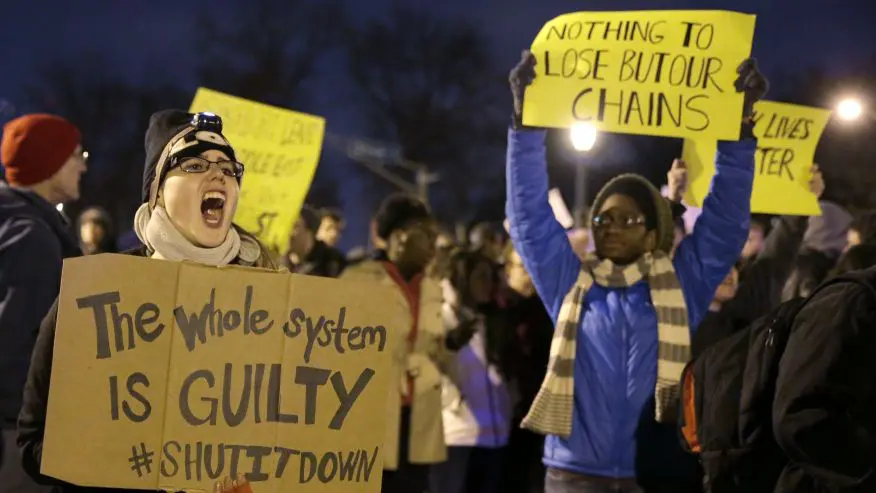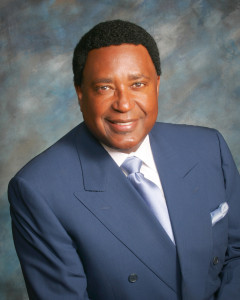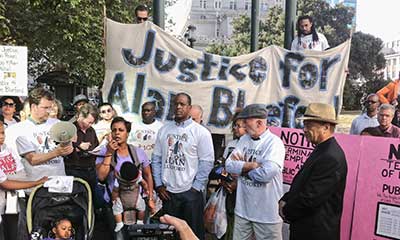California Bans Grand Juries in Police-Involved Deaths
Aug 22, 2015
Posted in Equal Rights/Equity, Police-Public Safety, Uncategorized
The ban is not a significant change to the pre-existing process, say civil rights experts

By Tulio Ospina
Public reaction was enormously positive last week when California became the first state to ban the use of grand juries in police-involved killings, but civil rights experts say the change is not significant.
Signed by Gov. Jerry Brown, the law – Senate Bill 227 – strips prosecutors of the option of allowing secret grand jury proceedings to decide whether or not to press criminal charges against local, state and federal law enforcement officers who commit violence against civilians.

The use of grand juries in these cases has come under severe public scrutiny last year after local police officers in Ferguson and Staten Island were not indicted for causing the deaths of Michael Brown and Eric Garner, sparking protests across the country.
Under the new law, prosecutors will solely be responsible for weighing evidence against law enforcement and deciding whether to file criminal charges, that is, whether to take the complaint to a preliminary hearing.
Unlike grand juries, preliminary hearings are presided over by a judge and the prosecutor presents live witnesses and evidence that are subject to cross-examination by the defense.
It is then up to the judge to answer whether there is enough probable cause that a crime was committed by the defendant.
All preliminary hearings are open to the public, whereas grand jury proceedings are held behind closed doors and rarely are the proceedings made public if the jury votes not to indict.
The California District Attorneys Association and the California Police Chiefs Association opposed the ban, while many civil rights workers say the banning of grand juries in these cases is a small step in the right direction but not enough to ensure that just decisions be made.

John Burris, civil rights attorney in Oakland, says the ban is not a significant change to the pre-existing process and will not secure more appropriate criminal prosecutions of police officers when deserving.
“The real issue is and has always been from the DA’s office because they make the decision on whether or not to indict,” said Burris.

“Now they don’t have the option of grand juries, which had transparency issues, but the local DAs in California rarely if ever used grand juries to begin with.”
According to Alameda County Assistant District Attorney Teresa Drenick, her office “does not use grand juries in these matters.”
In the widely publicized case of the killing of Oscar Grant, BART officer Johannes Mehserle was indicted through a preliminary hearing and found guilty of second-degree murder.
Assistant DA Drenick also has stated that there are times when grand juries are vital, such as in cases where witnesses and victims need to testify safely behind anonymity without threat or intimidation.
Contra Costa County District Attorney Mark Peterson said the ban on grand juries was a mistake and would not yield more transparency, contrary to the law’s intention.
“The district attorney always had the power to make criminal charges, and then a judge decides whether to indict,” said Peterson. “But a grand jury allows a community of 19 or so people to hear the charges, weigh the evidence and make the decision.”
“I admit they don’t return non-indictment transcripts to the public, but if that’s the concern, then just make those grand jury transcripts public,” said Peterson.
According to Walter Riley, a criminal defense and police misconduct attorney in Oakland, it is an important step for more transparency in the process, even if it does not mean that there will be more appropriate prosecutions.
Like other civil rights attorneys, Riley criticizes the “strong connection between the DA and the police, who work very close together.”
“As a result of working together, they don’t do a very good job of prosecuting police officers,” he said.
Three years ago, Riley spoke out against the Alameda County prosecutors’ decision not to press criminal charges against Oakland Police officer Miguel Masso in the shooting death of Alan Blueford.
The prosecutors decided that Masso had acted in self-defense and would not face criminal charges, a decision Riley questioned after examining the police report.
To solve the alleged biases between district attorneys and law enforcement, Burris says assigning independent prosecutors appointed by the attorney general to investigate police shooting cases is the essential next step.
Natasha Minsker, director of the ACLU of California Center for Advocacy & Policy, said “proposed legislation for independent prosecutors was killed by law enforcement lobbyists earlier this year.”
AB 953, a bill addressing the problem of racial profiling, is set for a vote in Senate, said Minsker. “Over 100 community groups and organizations, including #BlackLivesMatter, are supporting it but it’s facing very strong opposition from law enforcement.”
“We really need to push legislature to back necessary bills (like this one),” said Minsker. “Otherwise we won’t end police discrimination.”